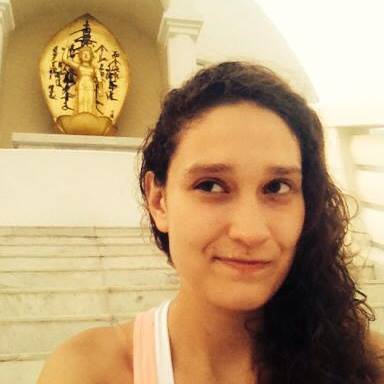
Julia Hintlian grew up in Cape Elizabeth, Maine.
The research project she completed in spring 2015 was titled "Narrative Structures in Classical India".
"The project, completed with the help of Professor Deven Patel, explored the different types of narrative structures that exist within the main Indian religious and philosophical traditions (Hinduism, Buddhism, Jainism) as well as within various extinct schools of thought and minor sects within these larger traditions. The project examined the contrasting and sometimes contingent benefits that are provided by myth and folklore as well as by proverbial and doctrinal wisdom. There was a significant focus on the different types of social lenses that various members of society use to make meaning from and gain access to their texts (women, spiritual leaders, etc.) We also explored the concept of accessibility within narrative as a key to the survival of complex thought and ultimately to the survival of tradition itself. Though there was an emphasis on reading primary source material (especially short stories), one of the ultimate goals of the project was to produce an annotated bibliography, and thus there was also attention devoted to discussing and writing about books such as The Clever Adulteress & Other Stories: A Treasury of Jain Literature, edited by Phyllis Granoff; The Hindus: An Alternative History by Wendy Doniger; Many Ramayanas: The Diversity of a Narrative Tradition in South Asia, edited by Paula Richman; and The Implied Spider: Politics and Theology in Myth also by Wendy Doniger.
I cultivated two key research skills this semester. First, I discovered the importance of being able to efficiently and effectively contextualize the material I was reading each week with the materials I had already read in order to organize my thinking and ultimately decide where the research would take me next. Second, I learned how to make decisions about which material to focus on and which material to put aside. In order to make headway, it was necessary to consistently streamline and to make difficult decisions to keep the project focused.
The weekly discussions I was able to have with Professor Patel were definitely the most rewarding piece of the project! It was very useful to have someone with whom to exchange ideas, especially because he was able to recommend new texts, to help me order my thoughts, and to teach me theories that helped me process textual material more fully.
The research I completed this semester will enable me to write a strong senior thesis, focused on narrative tradition in South Asia (and perhaps beyond), utilizing the extensive bibliography I have been creating. Additionally, Professor Patel and I have discussed expanding this research into the fall and I look forward to seeing how the foundation I have created will help me access a deeper understanding of narrative tradition and ultimately of religious thought and practice."

 South Asia Studies
South Asia Studies